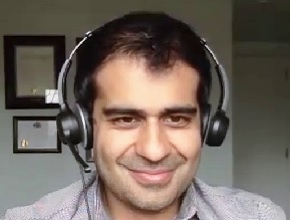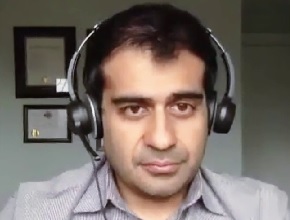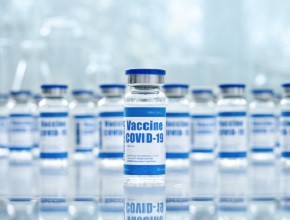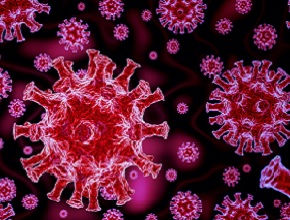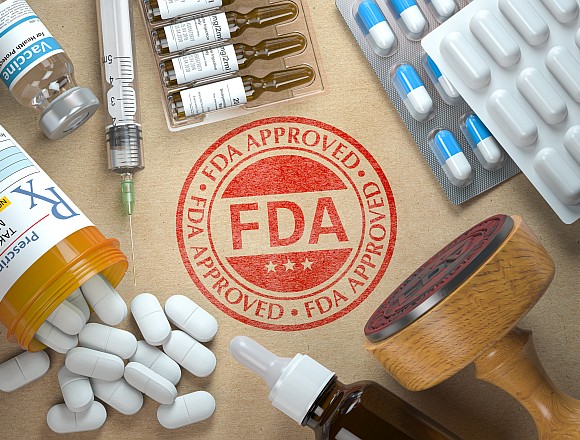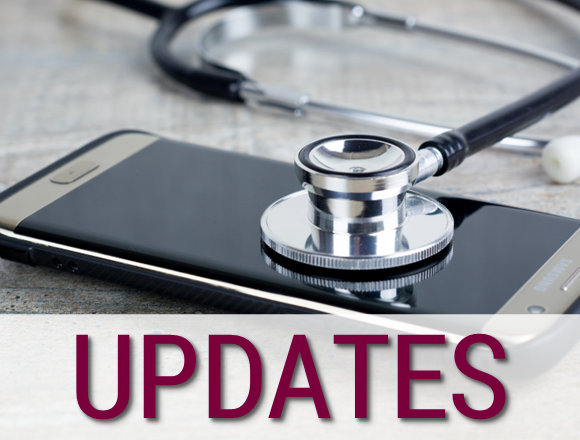Dr Zain Chagla, associate professor at the Faculty of Health Sciences at McMaster University, joins Dr Roman Jaeschke to discuss the efficacy of currently approved coronavirus disease 2019 (COVID-19) vaccines towards different variants of concern.
For part 2 of the interview, click here.
Roman Jaeschke, MD, MSc: Good morning, welcome to another edition of McMaster Perspective. We are having a privilege to have a media star of the COVID-19 era, Dr Zain Chagla. Zain, maybe you will introduce yourself and tell us about your role in Hamilton?
Zain Chagla, MD, MSc: I am Zain Chagla. I am an infectious disease physician at St. Joseph Healthcare in Hamilton and medical director of Infection Control there as well. I have been part of some clinical trials for COVID-19, some of the policy work around vaccinations, and even some of our therapeutic guidelines as part of this as well as some of our infection control guidelines for the city and the region.
Roman Jaeschke: Let’s use your brain then. Let’s start from the areas that I’m the least familiar with, which are not necessarily hospitalized and clearly non–intensive care unit (ICU) patients, which I know more of. So, let’s start from the first phase—vaccination. I believe we have 4 [vaccines] approved in Canada. What do we know now in terms of variants of interest, growing and spreading rapidly?
Zain Chagla: It is a very good question. Some of this can be broken up in the in vitro data—particularly for the mRNA vaccines, which were developed well before this era—and in vivo, real-life data in some of the vaccines that were developed afterwards.
Starting with the real-life data [on the] AstraZeneca vaccine, the chimpanzee adenovirus–based vaccine: It does not have any data around the P.1 variant that was first described in Brazil. The United Kingdom data, particularly in a cohort that was [studied] in Kent, [show that it] essentially performs at the same level as [towards] the wild-type virus, in terms of 70% to 80% prevention, particularly when there is a dosing delay of 12 weeks. And when done in South Africa, particularly in a study of about 1000 young individuals, 30 years old, [with] very minimal comorbidities, they saw very low neutralizing antibody levels amongst the cohort. But more importantly, when measuring mild-to-moderate COVID-19 in that cohort, they saw no difference in placebo versus getting the vaccination, which [means it] is likely that there is some breakthrough effect with the South African B.1.351 variant, which has an escape mutation.
Johnson & Johnson: Again, in the cohort in England, which was sequenced to B.1.1.7, [the vaccine] had an efficacy that was comparable to that [towards] the wild-type virus. And again, in South Africa they saw clinical response. Johnson & Johnson’s initial registration trial was [focused on] moderate-to-severe COVID-19 and saw 50% to 60% efficacy—although [there was] 100% efficacy towards hospitalization, but [in terms of] moderate-to-severe disease the efficacy was at 50% to 60%—which was lower than the wild-type efficacy. This suggests clinical response; lower neutralizing antibodies, but still probably enough immune effects to prevent severe disease.
Roman Jaeschke: Go ahead.
Zain Chagla: Sorry, go ahead. I’m happy you have a question.
Roman Jaeschke: To summarize this part for non-mRNA vaccines. It appears that [their efficacy towards] the wild[-type] variant is at least acceptable, with the exception of the South African [variant] for AstraZeneca; [here, the efficacy] is either acceptable or—for the Brazilian variant—unknown yet.
Zain Chagla: Yeah. The Brazilian [variant]… There are no data at all really, other than in vitro, some small in vitro studies. Again, [when it comes to] the South African variant in [the case of] AstraZeneca, mild—particularly mild—disease in young individuals wasn’t prevented by vaccination but, you know, it wasn’t the optimal regimen, it was a young group, there was no measure of hospitalization or severity, so there are caveats to this. And in the Johnson & Johnson trial, which was a slightly older cohort and the main outcome was moderate-to-severe COVID-19 including hospitalization, [there was] 50% to 60% efficacy—much better than what we’ve seen for AstraZeneca but [with] slightly different comparison points as well as a slightly different cohort that got vaccinated. Again, much more comorbidities and slightly older people in that context.
Roman Jaeschke: The mRNA now.
Zain Chagla: So, mRNA vaccines. Again, [there] are predominantly in vitro data. Now we know from the experience of Israel and the United Kingdom—Israel particularly, which right now is about 80% B.1.1.7—that the UK variant seems to be quite [susceptible] to the Pfizer vaccine in terms of prevention and there are data coming out [indicating] 90% to 99% after the second dose. The Moderna vaccine is theoretically similar. Again, it’s not the data set that we would like, but in vitro data look fairly reasonable in terms of neutralizing antibody levels. When we talk about variant first described in South Africa, B.1.351, it is a little bit more cloudy at the moment. We do see neutralizing antibody levels that are lowered, but we know that with vaccination the neutralizing antibodies are actually much higher compared with convalescent plasma. So, when we see a lower level, is it lower within the threshold of not being sterilized after an exposure or is it lowered to the point where someone can have a significant breakthrough infection?
At least data that were released in a preprint from Pfizer about their small clinical trial that was done in South Africa at this point suggest the efficacy is completely preserved, even in the Pfizer vaccine. That was out just a couple of days ago. Again, no data that were released... Nine people in the placebo [group and] 0 people who got the Pfizer vaccine developed COVID-19. Those 9 people were in an area that was predominantly [affected by] B.1.351 and sequenced to B.1.351.
Roman Jaeschke: This news is, I would say, relatively optimistic then.
Zain Chagla: If you go the Brazilian P.1 variant—because it’s the other one of concern—[there are] small in vitro studies suggesting that the neutralization or the loss of neutralization is somewhere between the wild-type and B.1.351 [variant]. So, it seems—based on in vitro data—that most vaccines will still work against the Brazilian variant, that the mechanism of immune escape there is not as potent as what we see in the South African variant. Again, this is a very new variant, it’s only been described in Brazil, there are very few clinical trials right now, but more data will emerge in real-life practice, I think, that will start answering this question.
Roman Jaeschke: I’ll tell you that we’ll need to have an update probably on a weekly basis. No, I’m joking. We’ll make it on a monthly basis on what’s happening. Thank you very much. It appears that at the moment, in Canada at least, the prevalence of the South African variant is very low I believe and we should take whatever vaccine is available. Am I right?
Zain Chagla: Yes, absolutely, absolutely. I mean whatever is available—based on contraindications, side effects, that type of things—all of them are gonna be efficacious and, again, the South African variant question still has not been answered for the severity of disease.
Roman Jaeschke: For clinically relevant disease.
Zain Chagla: Yes. There were data around T-cell function being actually [quite well developed and] preserved in people who got an AstraZeneca vaccine. It’s not completely off the table yet that it will still prevent severe outcomes, it just might not prevent mild outcomes from COVID-19.
Roman Jaeschke: Thank you very much and we’ll talk again.
Zain Chagla: No problem. All the best.
 English
English
 Español
Español
 українська
українська

